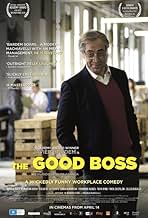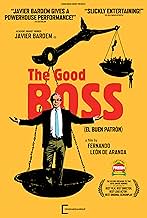VALUTAZIONE IMDb
7,1/10
15.739
LA TUA VALUTAZIONE
In attesa della visita di una commissione che possa premiare per eccellenza la sua azienda di bilance industriali, il suo titolare, cerca di risolvere velocemente gli eventuali problemi dei ... Leggi tuttoIn attesa della visita di una commissione che possa premiare per eccellenza la sua azienda di bilance industriali, il suo titolare, cerca di risolvere velocemente gli eventuali problemi dei suoi operai.In attesa della visita di una commissione che possa premiare per eccellenza la sua azienda di bilance industriali, il suo titolare, cerca di risolvere velocemente gli eventuali problemi dei suoi operai.
- Regia
- Sceneggiatura
- Star
- Premi
- 34 vittorie e 48 candidature totali
Yaël Belicha
- Inés
- (as Yael Belicha)
Nicolas Ruiz
- Hijo de Jose
- (as Nicolás Ruiz)
Recensioni in evidenza
By Maryam Tavatav (Critic)
Directed by Fernando Leon de Aranoa, "The Good Boss", as the representative of Spanish cinema at the 2021 Academy Awards, explores societies based on political-economic and capitalist systems and narrates becoming the number one in the workplace at any cost.
Blanco is the owner of a factory of industrial scales. This mere choice of scales connoting justice begins the chain of symbolism in this film. Throughout his speeches and interaction with others, Blanco manifests himself at the beginning of the story, as a compassionate, sympathetic boss who is willing to do anything for his factory workers. He keeps retelling this key phrase: "Every employee's problem is mine" and this is a fallacious statement that has been repeated over and over again throughout the organization's history causing all workers to believe in its legitimacy. However, another truth emerges as the film proceeds.
The film's main plot is based on this question: beyond this technicolor of slogans the capitalists chant in support of the workers, is their true face as sympathetic and benevolent as they look before the public and media? It remains to be seen to what extent these pretender capitalists adhere to moral statements when a tiny margin of their capital is jeopardized. This view does not contradict the concept of capital since the circulation of capital in society will certainly bring about economic prosperity that might be beneficial to the people. Meanwhile, the main point is how this benefit is to be distributed. Do people share in the benefits as much as they have contributed to the generation of wealth?
What elements must be in place in this cycle to achieve a higher level of assets? At this point, the main conflict is created; where various economic and political schools have made an attempt to come up with an answer. The script of a good boss also brings to light the extent of adherence to principles that are challenged in the face of a financial crisis and where the interest of employees comes into play. Simply put, when a problem occurs at the heart of the factory, despite Blanco's pretentious conduct favoring the workers, the manpower becomes the means to add just one more award to the wall of the owner's house at any cost. This comedic nature of the film, in a dark setting, mocks Blanco's superficial view of the fate of his workers. The film's final scene illustrates framed awards, with writings such as "Justice", here and there on the factory's walls, while its atmosphere is still filled with corruption and inequality.
The Good Boss can be introduced as the most allegoric and figurative film of the year considering its abundant use of meaningful symbols. The irony depicted in the film regarding the sense of justice and benevolence demonstrates that the director's preoccupation is way beyond a mere worker-employer incompatibility in the workplace. Behind Blanco's apparent good-naturedness in the guise of a spiritual father lives another human being: a man enjoying inheritance who is willing to do anything to preserve his capital so that he can add a framed award to those of others on the walls of his factory, lest a single penny be deducted from its capital; He somewhat represents a capitalist society that is willing to crush everything under the boots of power for the sake of achieving its material goals. Herein, the power relations are predefined and the authority is exclusively in the hands of a few and the others may enjoy a marginal benefit out of their vast fortune through deceitfulness. In fact, the concept of meritocracy and effort is the overlooked component of such thinking.
The element of surprise, which seems to be missing in almost all films these days, is well implemented in this film. The first impression that Blanco leaves on the audience is one sympathetic boss who follows the recent concepts in management science and perceives his workforce as the capital of his factory, while in the second half of the film, his true character is revealed once Blanco is put in a situation that his interests are at stake.
The brilliant performance of "Javier Bardem" in the leading role of this film must not be neglected. He shows such a dramatic personality change in his role that the viewer fully understands the nuances of his characteristics; his acting thoroughly serves the film's purposes and helps advance the narrative. The presence of influential supporting roles and sub-characters has also contributed to the completion of this puzzle and created an effective flow of transformation. The Good Boss possesses a professional cast of actors who have done well in their roles. The use of symbols and attention to detail have played a major role in expressing the main concept and theme of the film, especially when the seeds planted earlier are harvested and these symbols are used in the ending.
This film is a fine example of how deep political-economic concepts, whose presence is a grave concern in human life, can be sharply criticized with the correct and principled use of humor and comedy. Fierce criticism of political and economic structures does not necessarily require the production of serious films; rather one can voice the most serious criticisms by making a comedy film and force the viewer to contemplate.
Directed by Fernando Leon de Aranoa, "The Good Boss", as the representative of Spanish cinema at the 2021 Academy Awards, explores societies based on political-economic and capitalist systems and narrates becoming the number one in the workplace at any cost.
Blanco is the owner of a factory of industrial scales. This mere choice of scales connoting justice begins the chain of symbolism in this film. Throughout his speeches and interaction with others, Blanco manifests himself at the beginning of the story, as a compassionate, sympathetic boss who is willing to do anything for his factory workers. He keeps retelling this key phrase: "Every employee's problem is mine" and this is a fallacious statement that has been repeated over and over again throughout the organization's history causing all workers to believe in its legitimacy. However, another truth emerges as the film proceeds.
The film's main plot is based on this question: beyond this technicolor of slogans the capitalists chant in support of the workers, is their true face as sympathetic and benevolent as they look before the public and media? It remains to be seen to what extent these pretender capitalists adhere to moral statements when a tiny margin of their capital is jeopardized. This view does not contradict the concept of capital since the circulation of capital in society will certainly bring about economic prosperity that might be beneficial to the people. Meanwhile, the main point is how this benefit is to be distributed. Do people share in the benefits as much as they have contributed to the generation of wealth?
What elements must be in place in this cycle to achieve a higher level of assets? At this point, the main conflict is created; where various economic and political schools have made an attempt to come up with an answer. The script of a good boss also brings to light the extent of adherence to principles that are challenged in the face of a financial crisis and where the interest of employees comes into play. Simply put, when a problem occurs at the heart of the factory, despite Blanco's pretentious conduct favoring the workers, the manpower becomes the means to add just one more award to the wall of the owner's house at any cost. This comedic nature of the film, in a dark setting, mocks Blanco's superficial view of the fate of his workers. The film's final scene illustrates framed awards, with writings such as "Justice", here and there on the factory's walls, while its atmosphere is still filled with corruption and inequality.
The Good Boss can be introduced as the most allegoric and figurative film of the year considering its abundant use of meaningful symbols. The irony depicted in the film regarding the sense of justice and benevolence demonstrates that the director's preoccupation is way beyond a mere worker-employer incompatibility in the workplace. Behind Blanco's apparent good-naturedness in the guise of a spiritual father lives another human being: a man enjoying inheritance who is willing to do anything to preserve his capital so that he can add a framed award to those of others on the walls of his factory, lest a single penny be deducted from its capital; He somewhat represents a capitalist society that is willing to crush everything under the boots of power for the sake of achieving its material goals. Herein, the power relations are predefined and the authority is exclusively in the hands of a few and the others may enjoy a marginal benefit out of their vast fortune through deceitfulness. In fact, the concept of meritocracy and effort is the overlooked component of such thinking.
The element of surprise, which seems to be missing in almost all films these days, is well implemented in this film. The first impression that Blanco leaves on the audience is one sympathetic boss who follows the recent concepts in management science and perceives his workforce as the capital of his factory, while in the second half of the film, his true character is revealed once Blanco is put in a situation that his interests are at stake.
The brilliant performance of "Javier Bardem" in the leading role of this film must not be neglected. He shows such a dramatic personality change in his role that the viewer fully understands the nuances of his characteristics; his acting thoroughly serves the film's purposes and helps advance the narrative. The presence of influential supporting roles and sub-characters has also contributed to the completion of this puzzle and created an effective flow of transformation. The Good Boss possesses a professional cast of actors who have done well in their roles. The use of symbols and attention to detail have played a major role in expressing the main concept and theme of the film, especially when the seeds planted earlier are harvested and these symbols are used in the ending.
This film is a fine example of how deep political-economic concepts, whose presence is a grave concern in human life, can be sharply criticized with the correct and principled use of humor and comedy. Fierce criticism of political and economic structures does not necessarily require the production of serious films; rather one can voice the most serious criticisms by making a comedy film and force the viewer to contemplate.
It would appear comforting that there are still companies out there that genuinely care about the welfare of their employees, treating them like members of a big, loving family. And that's the image that Blanco Scales tries to convey, one that's placed the organization in the running for a regional business award, one of many such honors it has received over the years. Making this possible is the company's owner, a kindly paternal sort who seems concerned about the well-being of his staff - that is, insofar as it affects the company's welfare. This approach, however, often leads to undue meddling in the lives of workers, so much so that the boss will go to almost any lengths to achieve his goals by way of his employees and their families, especially when it comes to reflecting the proper image he's trying to project, a practice ultimately fraught with troubling complications. Writer-director Fernando León de Aranoa's latest serves up a biting satire about the business world and the extremes to which businesses will go to present squeaky clean, politically correct portraits of themselves to an easily gullible public, tactfully burying the compromises and questionable tactics they often must do in realizing that goal. This offering is a perfect vehicle for Javier Bardem as the oily protagonist, playing the part with just the right amount of insincerity to be convincing without looking cartoonish, in a role backed by a superb ensemble of supporting characters. It's regrettable that the picture gets off to a painfully slow start during much of the first hour, but the film more than makes up for this shortcoming in the second half, turning wickedly funny and occasionally disquieting in the second half. Be patient with this one, giving it ample time to develop; you won't be disappointed with the payoff.
The writing of the dialogue is terrific. Every carefully-scripted word and situation is loaded with bad blood, mercilessly shelling out the miseries of labor relations in Spain. Bardem's performance as a paternalistic and cronyistic businessman is superlative. A necessary condition to fully enjoy the film, since everything revolves around him. A tad slow development of the story notwithstanding (stylistically justified around a metaphor of balancing the scales?), we are in for a ride.
Spain's official entry to 2022's Oscars is so beautiful. It's light and funny yet so powerful. The screenplay is amazing. In a nice simple sarcastic way it tackles interesting topics like work environment and power. Javier Bardem gives an excellent Oscar-worthy performance, he's been getting many nominations for his role in Being The Ricardos but his performance in this film is even better, he should get nominated for both roles.
Fame and reputation is the priority of the boss with repeated spotlight shown on the wall of company awards. He takes huge pride and greatness of his achievements by indulging in all the fake commitments to his employees. They are not family, just resources to get things done. Last survey scene is so sarcastic with feminism, diversity and caring for elders in the company. All about balance. If not balanced, make it balanced. Like a bullet.
Lo sapevi?
- QuizIt is the most nominated film in the history of the Goya Awards (Spanish Oscar) with 20 nominations.
- BlooperTutte le opzioni contengono spoiler
- ConnessioniReferences Il padrino (1972)
- Colonne sonoreYala Bina
Written by Elham Al Wareeth, Mahmoud Ahmed, Marc Ferrari, & Matt Hirt
© By First Digital Music, 2FC Music & Universal Music Publishing S.I.U.
I più visti
Accedi per valutare e creare un elenco di titoli salvati per ottenere consigli personalizzati
- How long is The Good Boss?Powered by Alexa
Dettagli
- Data di uscita
- Paese di origine
- Siti ufficiali
- Lingue
- Celebre anche come
- The Good Boss
- Luoghi delle riprese
- Jose del Hierro, Madrid, Spagna(Clothing Shop)
- Aziende produttrici
- Vedi altri crediti dell’azienda su IMDbPro
Botteghino
- Lordo Stati Uniti e Canada
- 363.130 USD
- Fine settimana di apertura Stati Uniti e Canada
- 22.363 USD
- 28 ago 2022
- Lordo in tutto il mondo
- 7.334.753 USD
- Tempo di esecuzione1 ora 56 minuti
- Colore
- Proporzioni
- 2.39 : 1
Contribuisci a questa pagina
Suggerisci una modifica o aggiungi i contenuti mancanti

Divario superiore
What is the Canadian French language plot outline for Il capo perfetto (2021)?
Rispondi

![Tráiler [OV]](https://m.media-amazon.com/images/M/MV5BNTc1Y2M0MGItNjc4Yi00NmZmLTg2ZDItNWI4YmUxZjE1NDhjXkEyXkFqcGdeQXRyYW5zY29kZS13b3JrZmxvdw@@._V1_QL75_UX500_CR0)
































